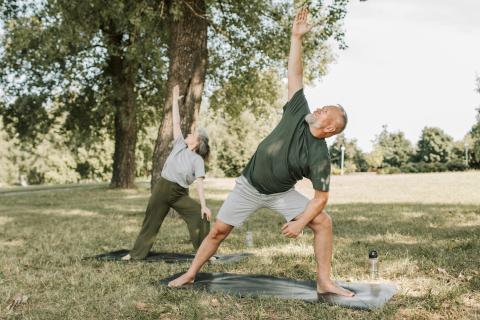
7 Ways to Mentally Prepare for Retirement
How to Mentally Prepare for Retirement
Retirement marks a significant life shift, affecting individuals on many levels beyond just securing a stable income. Without emotional and mental preparation, even the long-awaited transition to these golden days can be challenging.
It’s not unusual for new retirees to experience a sense of loss—whether it’s the purpose once found in their career, the social connections that came with work, or the challenge of finding meaning in daily life.
We’ve recently shared how the definition of retirement has evolved, making it less unusual for retirees to continue working part-time or managing a business. Regardless of whether you choose to fully retire or phase out work over time, we’ve put together the ideas below to help you navigate some of the most common challenges, leading to a more balanced and fulfilling retirement.
Envision your ideal retirement
If you haven’t already, take some time to dream about your ideal retirement. Who are the people that you want to spend more time with now that it may finally be possible to do so? What have you always wanted to do in your working days that you simply didn’t have time for?
Make a list of things you’ve always wanted to try, whether it’s new hobbies, travel destinations, or creative projects. Creating a vision board or writing down your retirement goals can make this next chapter exciting and make it easier to account for these goals in your retirement spending plan.
A few years before retirement, you could even start creating a “Dream Retirement” journal where you make note of all the things you’d like to accomplish and then track how your vision evolves over time as you get into retirement.
Examine your expectations about retirement
Retirement isn’t all about endless freedom and leisure. While you’ll have more time for yourself than you did when working, it’s also a period of change where you may not know how each day’s going to unfold until you get to it.
By viewing your expectations in light of what you can actually plan for, you’ll reduce the likelihood that you’ll be disappointed if not all of the activities or experiences you planned for come to fruition right away.
Start by asking yourself what you currently expect out of retirement.
- What are you most looking forward to? What do you think will bring you the most meaning and joy in your retirement days?
- Is it realistic to expect that you will be able to do these things on a consistent basis?
- Do you have a plan in place for potential contingencies and life changes?
Approach retirement with an open mind and set positive intentions for your days, versus expectations. It allows for flexibility, and there is less pressure to "get it right."
Reconnect with your identity beyond work
The shift from being defined by your career to finding new meaning outside of work can be disorienting. Your work life likely gave you at least some sense of purpose or fulfillment. Without the daily routine of work, it can be easy to feel disconnected from that sense of purpose or meaning.
To uncover a deeper sense of identity beyond your daily work life, take some time to reflect on passions and values that go beyond work. Seek out others in your community who are involved in these to see if you could explore these passions or values together. Perhaps even consider volunteer opportunities or mentoring roles that allow you to share your passion or wisdom while giving back.
Build a strong social network
One of the things that many of our clients say they often miss most as they enter retirement is their daily social interactions with co-workers. That’s why it can be very helpful to start building your social network even before you retire.
Here are some ideas for ways to stay socially active to reduce feelings of loneliness or social isolation as you retire:
- Schedule regular social activities, like coffee dates, phone calls, or walks with friends or family….even ones you haven’t talked to in a while.
- Consider joining local clubs or online groups that align with your interests to meet like-minded people.
- Explore community centers that offer classes or events where you can connect with others and build new friendships.
Just because you’ve left the workforce doesn’t mean you need to leave behind your professional relationships. Reaching out to former colleagues for a coffee or catching up over the phone can keep those bonds strong. Plus, staying in touch can even lead to new opportunities, like mentoring or consulting.
Create a daily wellness routine
While working life may not have allowed much time to take care of yourself as much as you may have liked, retirement offers an opportunity to start anew. Before entering retirement, create a rough draft of a daily wellness routine that will make you feel healthy and vibrant.
Consider including regular physical exercise, such as walking, swimming, or yoga, to maintain physical fitness and boost your mood. Schedule a time each day to plan and prepare nutritious meals or to enjoy meals with friends and family.
You could even consider integrating meditation or mindfulness practices to help ease stress and anxiety. This can also create the space to process emotions in a more objective manner so you can make better decisions and respond to challenges more effectively. Additionally, practices like gratitude have been shown to enhance a personal sense of well-being.
And of course, no daily wellness routine would be complete without dedicating some time to connecting with loved ones and friends, whether through visits, calls, or shared activities to strengthen relationships and social bonds.
Have a plan for dealing with boredom
If you don’t find ways to stay engaged, it can be easy to start feeling restless or bored within those first few months of retirement. Here are some ideas to help:
- Keep a list of hobbies you’re curious about and explore them one at a time. Invite friends or family to join you in your new activities for extra social engagement.
- Set aside time each week to try something new, like cooking a new recipe or starting a creative project.
- Find a place where you might enjoy volunteering so you can keep active and make new friends. As you help others, volunteering can provide a feeling of pride and satisfaction, important to your emotional well-being.
Additionally, you can tie all of the above together by exploring mentoring opportunities where you can share your hobbies or expertise with younger generations.
Address anxiety about financial stability
The idea of living off of your savings or a fixed income can feel scary and can be a major source of mental stress in preparing for retirement. Having a financial plan in place can help bring peace of mind, knowing that you have a systematic way to plan for generating enough income without draining your portfolio. If you’re not sure where to start, check out our blog on 5 steps to streamline your retirement planning for some ideas.
In addition, it’s important to address risk management even before you retire. Start by getting familiar with the Big Five Retirement Risks that every retiree will face:
- 1) Spending risk
- 2) Sequence-of-returns risk
- 3) Purchase power risk
- 4) Longevity risk
- 5) Investment risk
Taking the time to understand these risks and how to mitigate them can help ease a lot of the stress that can come from preparing for retirement.
Working with a financial advisor who specializes in retirement planning can help you create a clear retirement roadmap while setting and implementing the strategies needed to help you achieve your ideal retirement lifestyle.
As retirement planning specialists, we understand that retirement brings unique emotional challenges. We’re here to help you prepare - financially and mentally - to make this transition smooth and less stressful. If you’d like us to help you prepare a plan for your retirement days, you can get in touch with us here.

